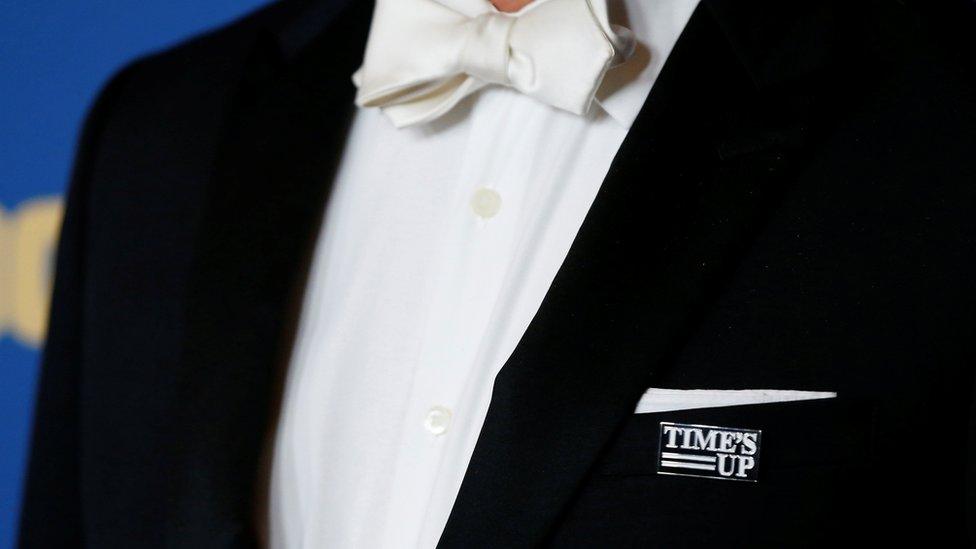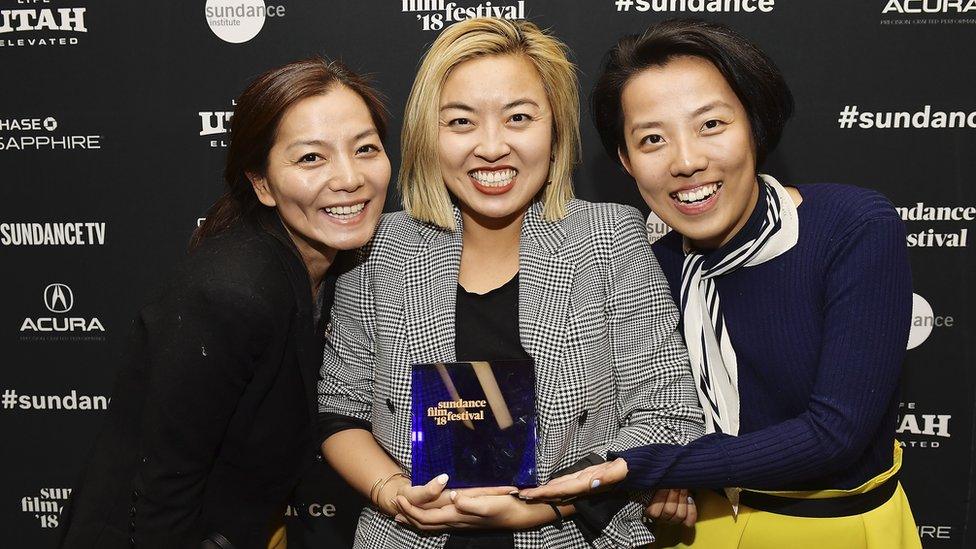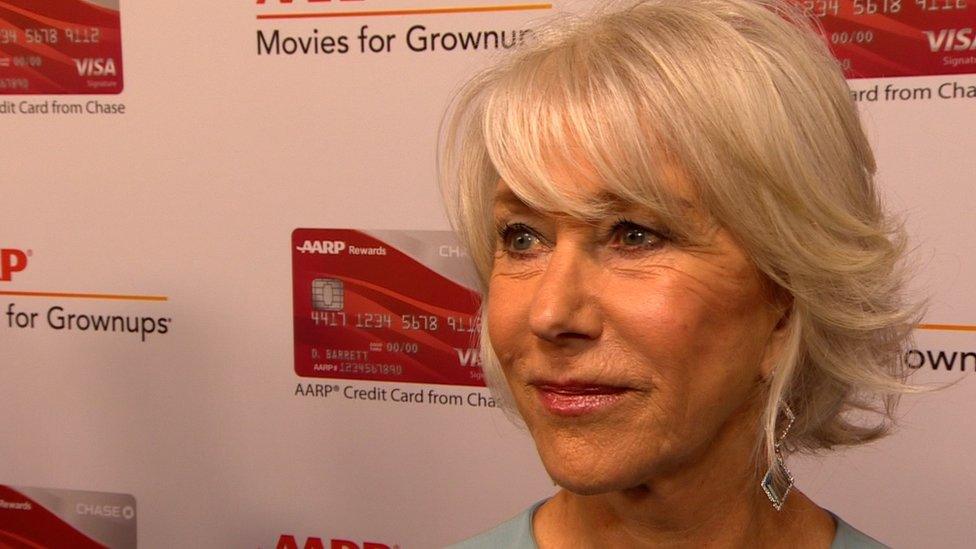Is #meToo changing Hollywood?
- Published

Female writers and directors are suddenly in hot demand in Hollywood. But will the change last?
Since the downfall of powerful producer Harvey Weinstein, stories of sexual harassment, assault and widespread abuses of power have rocked industries around the US and the world.
But none has been more shaken than the entertainment industry.
The accounts of sleaze in Hollywood and an insidious "casting couch" culture have resulted in the entertainment industry taking a closer look at itself.
Some calling for change say the solution to Hollywood's sexism is simple - hire more women crew members, writers and directors.
"The root of the harassment issue is actually inequality in employment," says Leah Meyerhoff, the founder of Film Fatales, a support group for female directors.
"Clearly when the majority of people in power are these able-bodied straight white men, a side effect is sexual harassment on set and in the world."
Of the top 100 grossing films of 2017, women represented 8% of directors; 10% of writers; 2% of cinematographers; 24% of producers and 14% of editors, according to the Center for the Study of Women in Television and Film at San Diego State University.

Directors talk about what's changing in Hollywood over brunch
Could the Times Up and #MeToo movement result in a more diverse workplace in Hollywood? Many women here feel like the doors are opening. Agents and studios are scrambling to get behind female-driven projects.
"Every studio in town is desperate for women writers," a writer friend says while dropping off her son at school, adding that she's dusting off her old, rejected scripts.
In an industry where female writers have used masculine-sounding pseudonyms to get their material read, suddenly "Written by Alex" has become "Written by Alexandra".
And this year's pilot season includes what's believed to be a record number of women directors - out of 41 broadcast drama pilot directors, 14 are women. Multiple, female-driven shows are being piloted at all of the US broadcasters, including a reboot of Cagney & Lacey and the return of the fictional investigative journalist Murphy Brown.
Only a handful of the pilots will make it onto TV - but the networks and advertisers will have many shows to choose from.
At a Sunday brunch in Hollywood hosted by Film Fatales, a group of women filmmakers said their optimism was tempered with scepticism that things are really changing. Doors may be opening, but will projects be "green-lit" and funded across the industry?
"Whether that has shifted - whether women are being hired more I'm not sure," says Meyerhoff.
Many of the female directors at the brunch were just back from the prestigious Sundance Film Festival in Utah.
This year was hailed as a great year for women at the festival, with 37% of feature films there directed by women.
But it was also a quiet year for sales and distribution deals. Many of the movies celebrated at the festival may not be coming to a theatre near you any time soon.

Producer Jane Zheng, director Cathy Yan, and producer Clarissa Zhang (l-r) after accepting a Special Jury Award for their film Dead Pigs at Sundance
While many men are supportive of women fighting for better roles in Hollywood in front of and behind the camera, others are scared of what the movement means for their careers.
One white, male director (over drinks and off the record) told me that Hollywood TV shows are so desperate to employ women that they're getting the hairdressers to direct.
"It's never been a worse time to be a white guy in Hollywood," he said.
When pressed for specifics, the director who told me the rumour couldn't identify a single TV show or other project where the hairdresser had been yanked from the hair and makeup trailer to the directors' chair.
But it's a rumour - albeit an outrageous one - typical now in Hollywood.
And women in the industry say most men around them don't fear being exposed for past crimes, but they do fear what a balanced workplace would do for their creative process.
How #OscarsSoWhite changed my life
"The men are afraid if we hire more women they won't be able to make raunchy jokes," says one writer. She works on a network sitcom where eight of the 10 writers are men, even though the show was created by a woman and is about a woman.
She says the women also tell raunchy jokes in the writers' room. "It's ludicrous," to suggest female writers stifle creativity, she says.
Actresses speaking out against the sexual harassment and assault in Hollywood say women here are experiencing a watershed moment. But as the awards season comes to a close with the Oscars, there's a risk that Hollywood's conversation and momentum will change.
Dame Helen Mirren told the BBC that when she started her acting career, "99.9%" of the people on set were men.
"Now it's 75% male."
But Dame Helen says the culture is changing.
"We've still got a long way to go but there is definitely a change coming without question," she said on the red carpet of the Movies for Grownups Awards.
"We're all culpable," she added. "They are cultural attitudes... and for so long we've been told 'it's nature'. They're not nature. It's culture and culture can change."

"There is definitely a change coming without question," says Dame Helen Mirren
Some big names are putting money behind longer-term solutions. Director Ava DuVernay and producer Dan Lin have started an internship programme with the city of Los Angeles to increase opportunities for people traditionally excluded from the entertainment industry.
"When 'Oscars So White' and 'Time's Up' put a spotlight on inequality in Hollywood, they captured the frustrations of people shut out of opportunity in what the world knows as LA's signature industry," said Los Angeles Mayor Eric Garcetti announcing the creation of the Evolve Entertainment Fund.
The fund, Garcetti says, is aimed at giving people "in under-served communities a new opportunity to chase their dreams in Hollywood" whether they want to be an award-winning director or are looking for one of the behind-the-scenes jobs which he calls "the bedrock of this city's middle class".
And Nina Tassler, the former head of CBS Entertainment, has teamed up with producer Denise Di Novi to form PatMa Productions - with a plan to tell diverse stories for film and TV.
"We recognise that diverse voices from diverse backgrounds make innovative storytelling, which is good for business," Tassler said. "It's a critical time."